Immunizing Hard-to-Reach Children Saves Lives in Challenging Contexts
Published on April 19, 2024
by MOMENTUM Integrated Health Resilience Staff
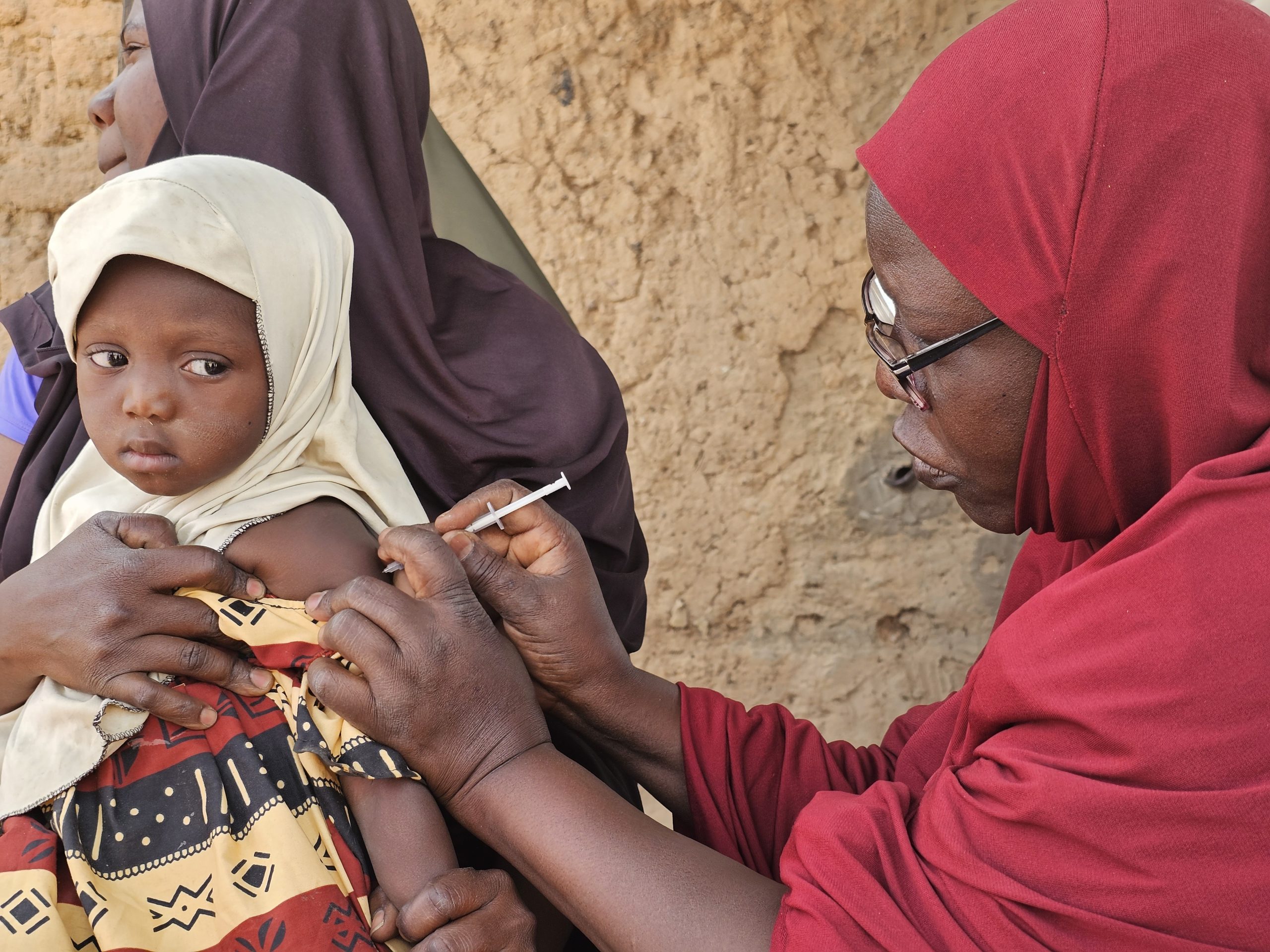
Immunization is an effective contribution worldwide to reducing disease and infant and child mortality. For MOMENTUM Integrated Health Resilience, expanding and strengthening immunization efforts in areas that are especially insecure and remote are key to reaching children who may not otherwise have access to lifesaving vaccines.
World Immunization Week reminds us of the vital role that immunization plays in keeping children healthy, and this year, we celebrate the 50th anniversary of the launch of Expanded Programs on Immunization (EPI) across the world. World Health Organization (WHO) figures show that the number of children globally missing out on any vaccination declined from 18.1 million in 2021 to 14.3 million in 2022 (the pre-pandemic 2019 level was 12.9 million). This figure is tracked as “zero-dose” children who did not receive the first dose of the vaccine, which includes protection against diphtheria, tetanus, and pertussis (DPT1) by 12 months of age.
In contributing to these results, MOMENTUM collaborates with partner countries’ EPI and local nongovernmental organizations. This support includes country adaptation of the WHO “Reaching Every District/Reaching Every Child” (RED/REC) guidelines to specific subnational contexts and integrating health resilience approaches, which help to ensure the continuation of services during shocks and stresses. Reaching zero-dose and under-immunized children also involves tailoring local “microplanning” through engaging with hard-to-reach communities and building capacity with health providers and community health association leaders to implement these immunization microplans. This includes outreach adapted to the specific context, as well as mobile strategies.
MOMENTUM’s efforts to reach zero-dose children are highlighted in a special series of technically oriented products on the MOMENTUM website, including how we are supporting RED/REC adaptation for immunization in fragile settings. We further detail below local and human-centered work with Niger, Mali, and Burkina Faso, contiguous West African countries that are experiencing ongoing shocks (sudden population movements, armed conflicts, disease outbreaks) and stresses (e.g., poor roads, seasonal flooding and droughts, electric outages).
Niger
Although disease prevention is a major component of reducing illness and death, only 56 percent of the population in Niger has reasonable access to health services, including immunization, according to national figures.
Over the past two years in Niger’s Dosso and Tahoua regions, MOMENTUM has helped Niger’s EPI effort reach over 235,000 children with a first dose of Pentavalent vaccine,1 and another 223,000 children with a third dose of Pentavalent vaccine. Nearly 200,000 children were also reached with the measles vaccine.
In addition, the results and recommendations from a MOMENTUM-supported assessment of the RED/REC approach in Niger were shared at a national workshop of relevant stakeholders. Such evidence-based approaches ensure the most effective and efficient use of resources. At the local level, MOMENTUM contributes to community health resilience by integrating emergency preparedness and response plans into immunization microplanning. This makes it possible to reinforce the extension of immunization activities in intervention areas, even in times of shock and stress.
“The search for zero-dose and insufficiently vaccinated children in our intervention zones is the great challenge that we seek to meet,” says Maniratou Aboubacar Ada, MOMENTUM Integrated Health Resilience/Niger’s Child Health and Immunization Officer. “Our work also contributes to health resilience by conducting community analysis of health disasters. This approach enables the community to observe, adapt to, and cope with a shock or stress while continuing the use of health services such as immunization.”
MOMENTUM training has also elevated the perceptions of immunization and health workers in Niger. Mariama Mahaman Moutari, working with MOMENTUM for the past two years as the Chief Medical Officer at Lacroussou Integrated Health Center in Dosso, notes that this training has made it possible to reach more children and gain additional community acceptance.
“What I like most about this job is the satisfaction of our patients and, above all, the trust they place in us. My work is very exciting but requires a great deal of concentration, compassion, and patience,” says Mariama. “I want community members to understand that we are always available to listen to them, provide good case management, and respond to their health needs.”
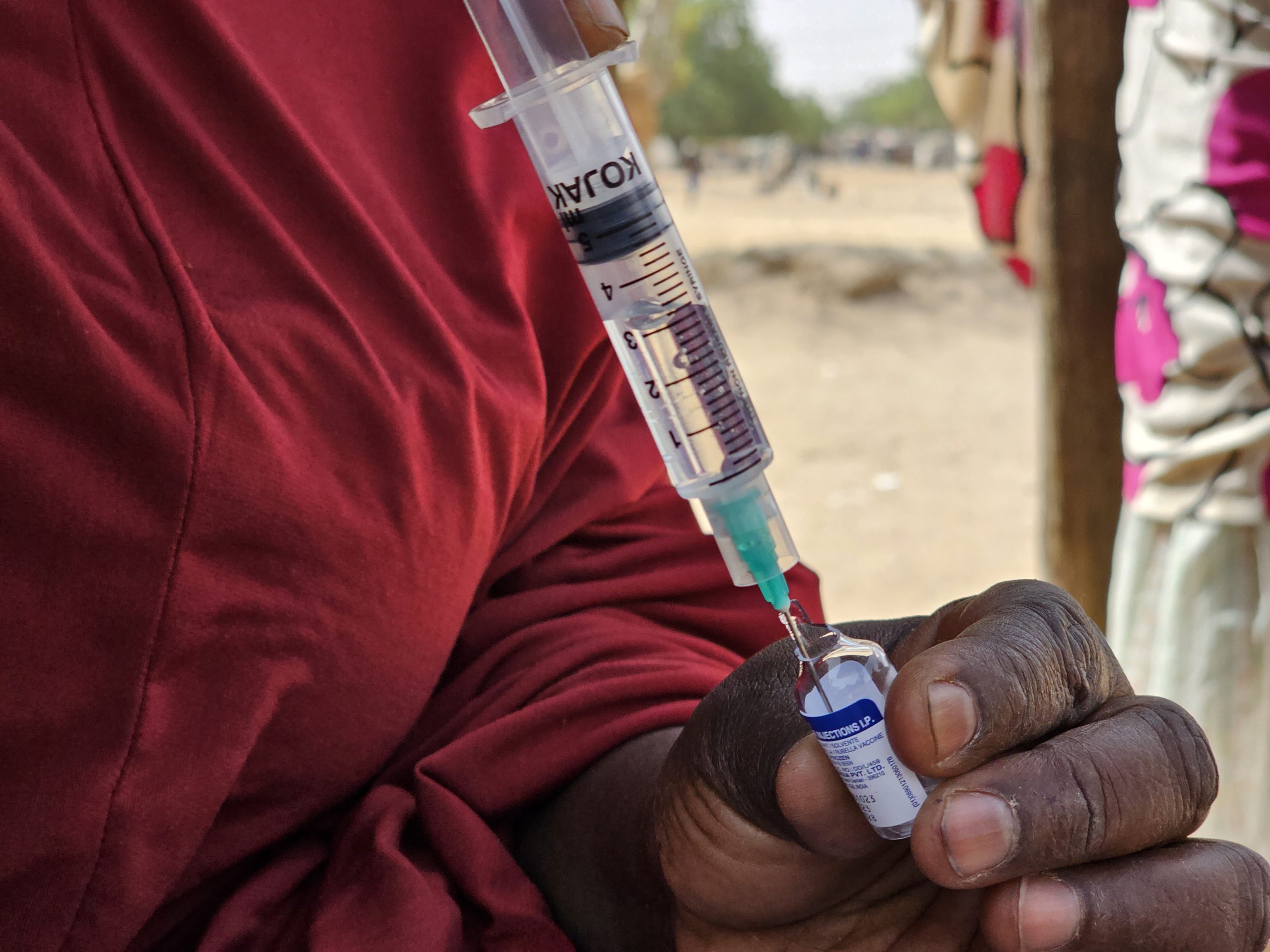
Mali
In Mali’s Gao and Timbuktu districts, MOMENTUM supported the government in 2023 to fully vaccinate approximately 250,000 children aged 0-23 months. Given the insecurity in Mali caused by armed groups and poor infrastructure, special focus and planning are vital to getting children immunized on time with the right vaccines.
Ibrahim Maiga, the technical director of a health center in Timbuktu, has attended MOMENTUM trainings across various topics, including integrated management of childhood illnesses, community health, voluntary family planning, and microplanning. His center provides services related to immunization, nutrition, water, sanitation, and hygiene. He also plans and monitors vaccination activities, trains community health workers, mobilizes communities for vaccinations, and monitors disease outbreaks.
“People know that we are here to support their healthy well-being. For me, being at the service of a rural community living in precariousness, there is joy from providing a good service,” says Ibrahim. He also understands the investments needed: “Health is priceless, but it comes at a cost.”
Local farmer Madiou Boubacar sees the value in the health center and immunization for his two children, aged 1 and 5 years: “Since our village has had the health center, child deaths have become very rare, and polio has disappeared. Thanks to MOMENTUM, our health workers are diligent in their work, and they regularly raise awareness of and mobilize for vaccinations.”
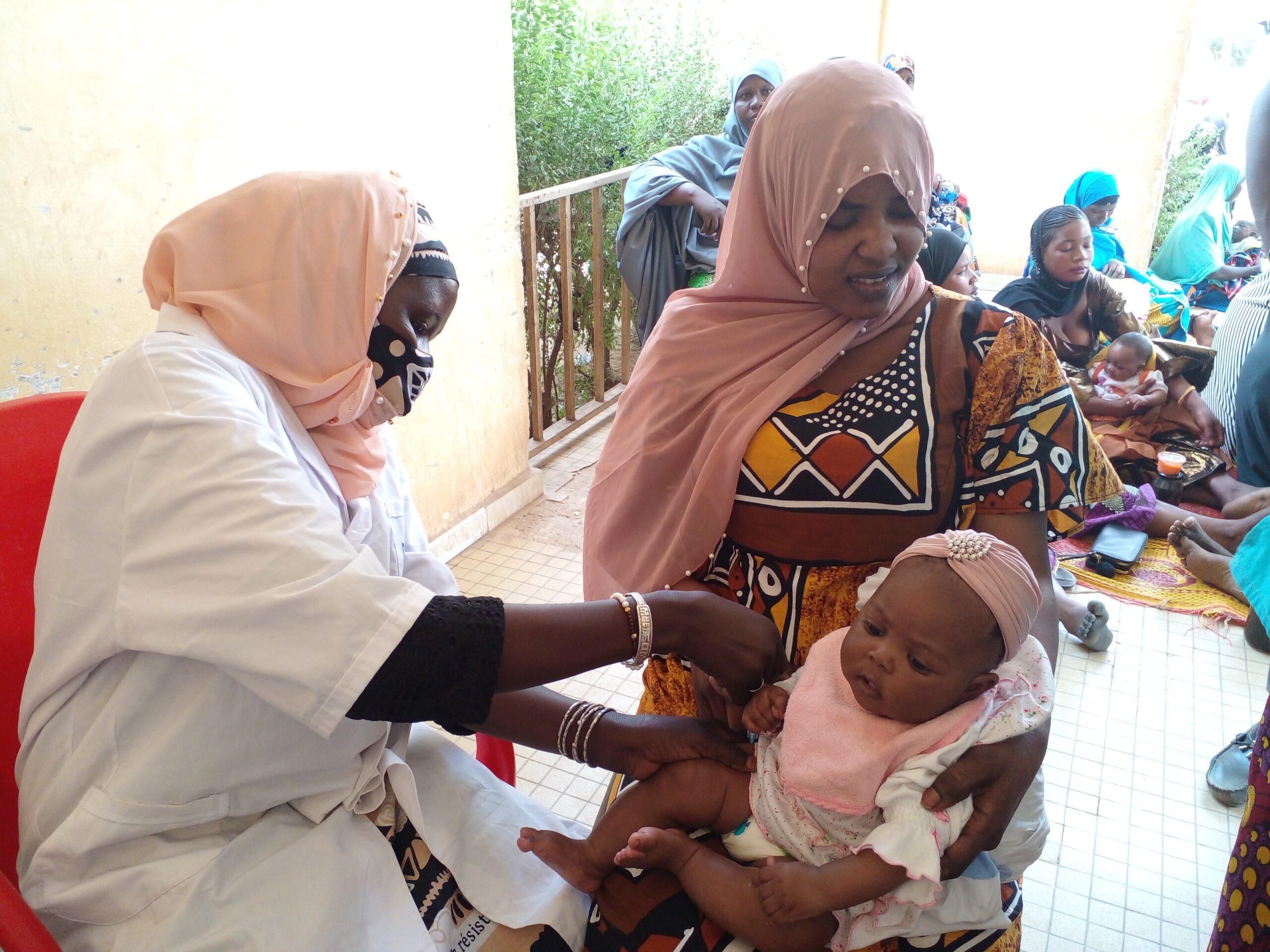
Burkina Faso
MOMENTUM Integrated Health Resilience operates in three regions of Burkina Faso: Center-East, Center-West, and South-West. At the national level, the project supports the Ministry of Health with capacity building for vaccination stakeholders and adapting vaccination tools such as RED/REC and microplanning guides to effectively reach zero-dose and under-vaccinated children and their families.
To date, MOMENTUM has trained 680 local health agents on the RED/REC guidelines, helped 106 health centers develop and implement RED/REC plans with their microplanning, and supported 334 health centers across 11 health districts—making it possible to vaccinate over 200,000 previously zero-dose children. In addition, the project provided financing and technical support for implementing COVID-19 immunization campaigns, enabling 244,157 community members to be vaccinated.
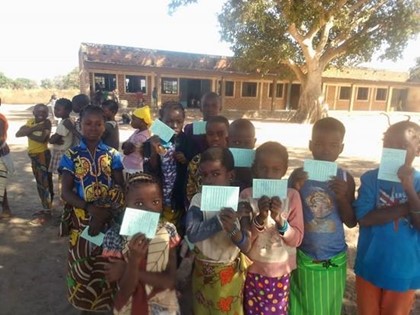
Head nurse Siméon Kaboré works in a community clinic and sees the impact of MOMENTUM’s work every day as he coordinates vaccine activities.
“Our immunization work is truly important because it helps communities prevent epidemic diseases and, in turn, helps children grow up healthy,” notes Siméon. “In the past, many diseases existed, but nowadays, we see their absence, thanks to vaccination.”
Hamado Sawadogo, a MOMENTUM Immunization Officer in Burkina Faso, reminds us that immunization can also foster economic benefits: “Vaccination allows people to stay healthy, which improves the quality of their work and increases their family income. Vaccination saves the population money they would otherwise spend on health care.”
Back in Niger, Rakia Zabeirou, a mother of three, brings her 8-month-old son, Issa Moussa, to the Sabon Gari Health Center in Tahoua for his vaccines. She summarizes the significance ofMOMENTUM’ss immunization work. “My family uses health services frequently, especially the vaccination services,” she explains while holding her uncertain infant. “Immunizations help keep families always in good health. MOMENTUM sensitized us on the importance of vaccinations.”
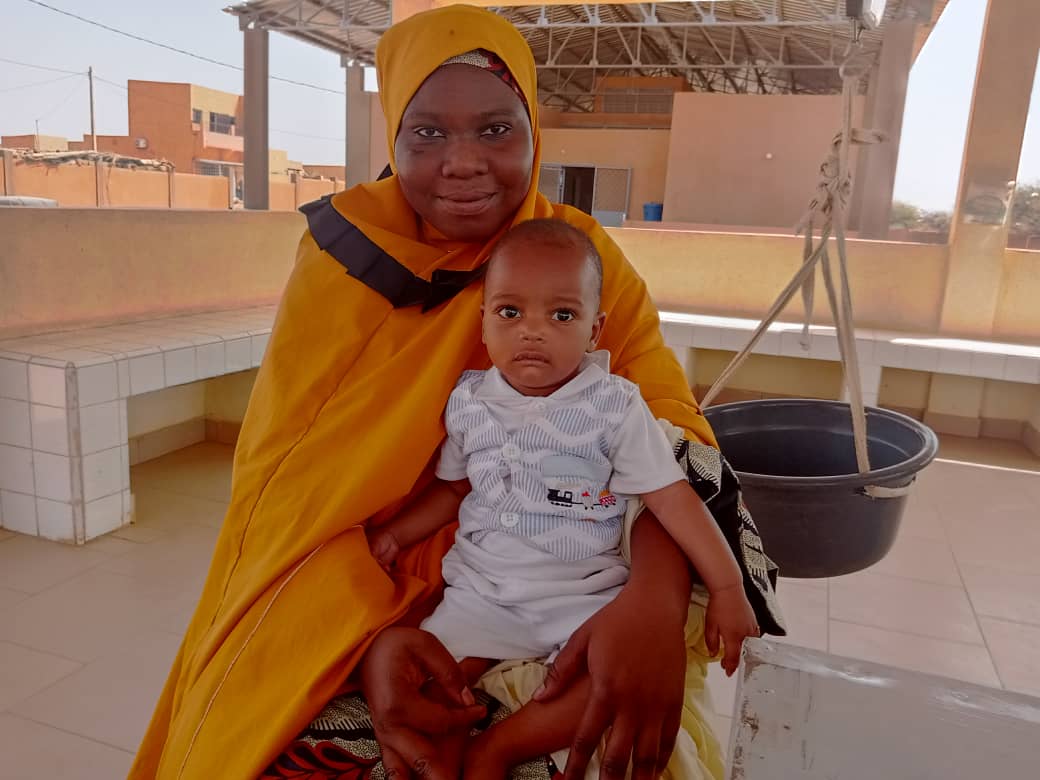
Reference
- “Annuaire Statistique 2017-2021, Edition 2022.” https://www.stat-niger.org/. Niamey, Niger: Institut National de la Statistique, 2022. https://www.stat-niger.org/wp-content/uploads/annuaire_bulletin/annuaire/Annuaire_Statistique_version_du_31122023_vf.pdf.

